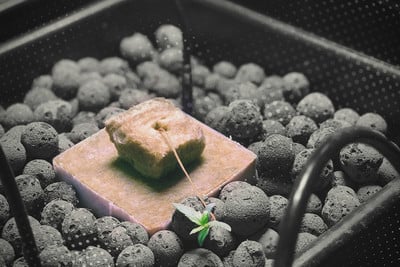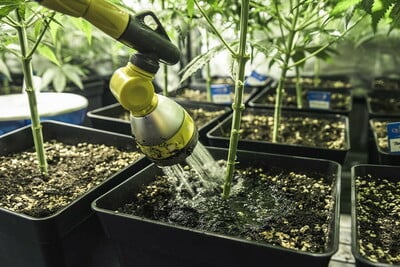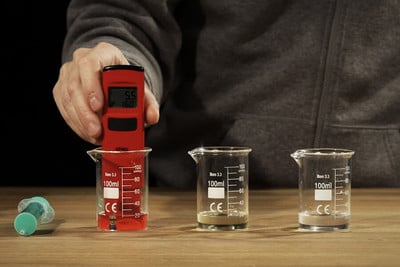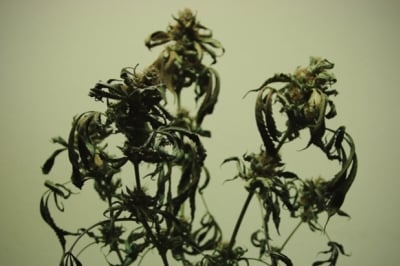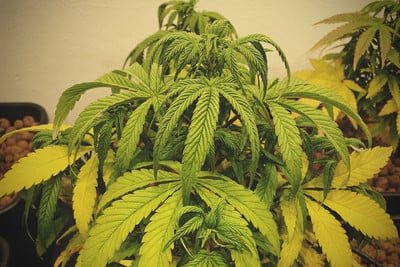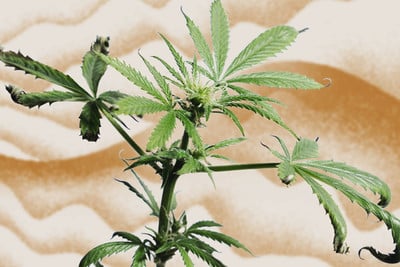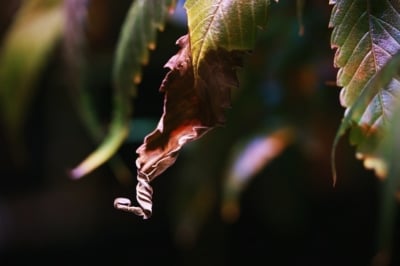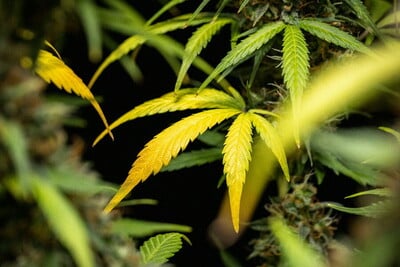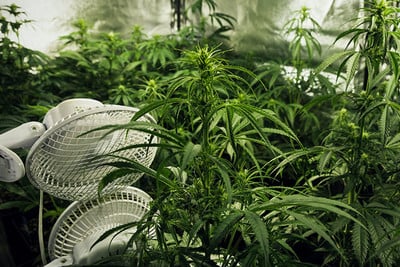.

Why Are My Cannabis Leaves Curling? Common Causes and Remedies
There are numerous reasons why you might find curly cannabis leaves in your grow-op. This guide will explain why this phenomenon occurs, and what you can do to prevent it from ruining your final product.
Contents:
Key Points
- Cannabis leaves curl up or down when faced with specific environmental stressors.
- Pests, diseases, temperature, humidity, and other factors can cause leaf curling.
- Learn to prevent leaf curling by properly managing your growing environment and plant feeding schedule.
- Discover how to treat the condition using techniques such as predatory insects and proper watering methods.
Leaves can tell you a lot about the health of your cannabis plants. Waxy, dark green, and turgid leaves are a sign of good health. Curling leaves, however, can signal a range of different problems.
Leaves that curl upwards often indicate issues with light, heat, or humidity, while leaves that curl downwards signal overwatering or nitrogen toxicity.
If you’ve come across curling leaves—don’t fret. There are several steps you can take to remedy them and get your crop back on the right path. Discover them below.
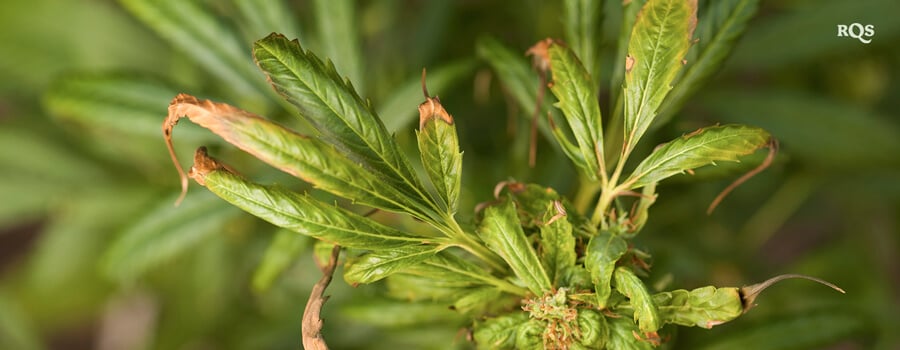
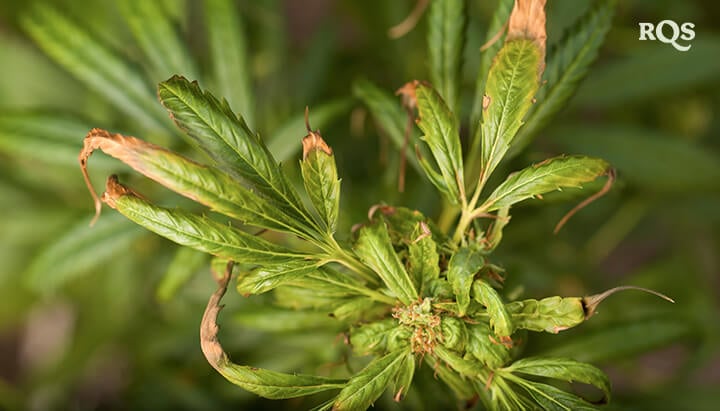
What Causes Curling in Cannabis Leaves?
Curling leaves are a stress response. Weed plants become stressed whenever they’re faced with detrimental environmental conditions.
Biotic stressors (living organisms), such as pests and diseases, are a significant source of plant stress. By destroying tissues and sucking out sap, they take a severe toll that sometimes results in curling leaves, among other textbook symptoms.
Abiotic stressors (non-living factors) also impact cannabis plant growth and productivity. This long list of environmental variables includes temperature, humidity, light intensity, overwatering and underwatering, pH, and nutrient levels.
Learning to “read” leaves is an important skill for any cannabis grower. Once you get to grips with this foliar language, you’ll be able to quickly diagnose a range of botanical issues, from nutrient deficiencies and toxicity to different pests and diseases.
-
Why Do Cannabis Leaves Curl Up?
Cannabis leaves curling up occurs as a reaction to specific biotic and abiotic stressors. These include:
- Heat stress: High temperatures cause marijuana leaves to curl upwards as plants attempt to reduce their surface area to limit exposure to strong light and water loss through transpiration.
- Low humidity: Weed leaves also curl upwards to minimise water loss through transpiration when exposed to dry air.
- Light burn: Excessively strong light, which causes light stress, can cause cannabis leaves to curl up.
- Nutrient imbalance: Both potassium and calcium deficiency contribute to the upward curling of leaves because of their role in water uptake and structural integrity.
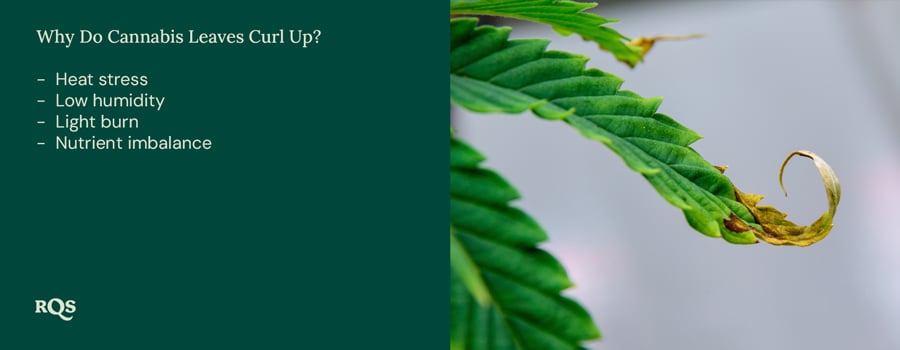
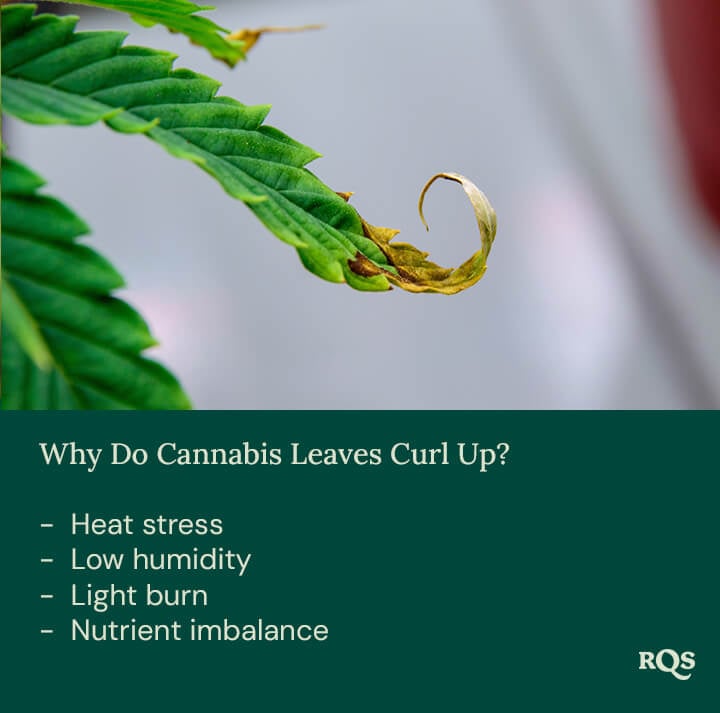
-
Why Do Cannabis Leaves Turn Down?
Cannabis leaves curling down is typically the result of the following issues:
- Nitrogen toxicity: Nitrogen plays a fundamental role in healthy growth, but too much is toxic to plants and causes leaves to become abnormally dark green and to curl downwards.
- Overwatering: Excessive watering can suffocate roots, and reduced oxygen can cause leaves to droop.
- Cold temperatures: Chilly temps also cause cannabis leaves to curl down, owing to slowed metabolism.
- Salt build-up: Too much salt in the soil can cause osmotic stress, resulting in the downward curling of weed leaves.
- Root rot: Certain fungal infections, such as Pythium, target cannabis roots. Subsequently, impaired nutrient and water uptake can cause leaves to turn downwards.
- Diseases: Various diseases that target foliage can also cause general wilting and downward curling.
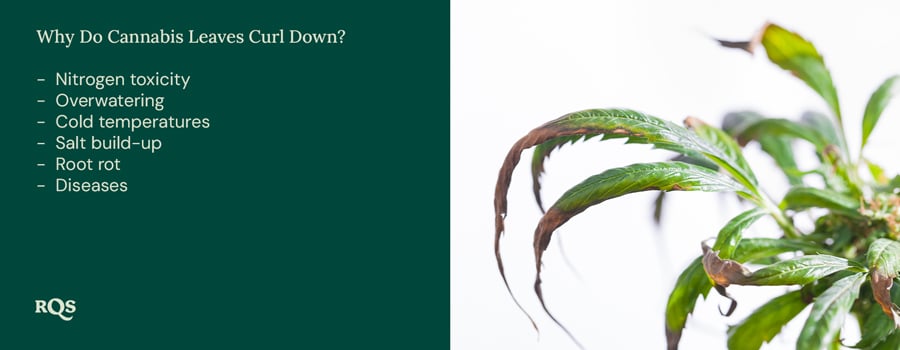
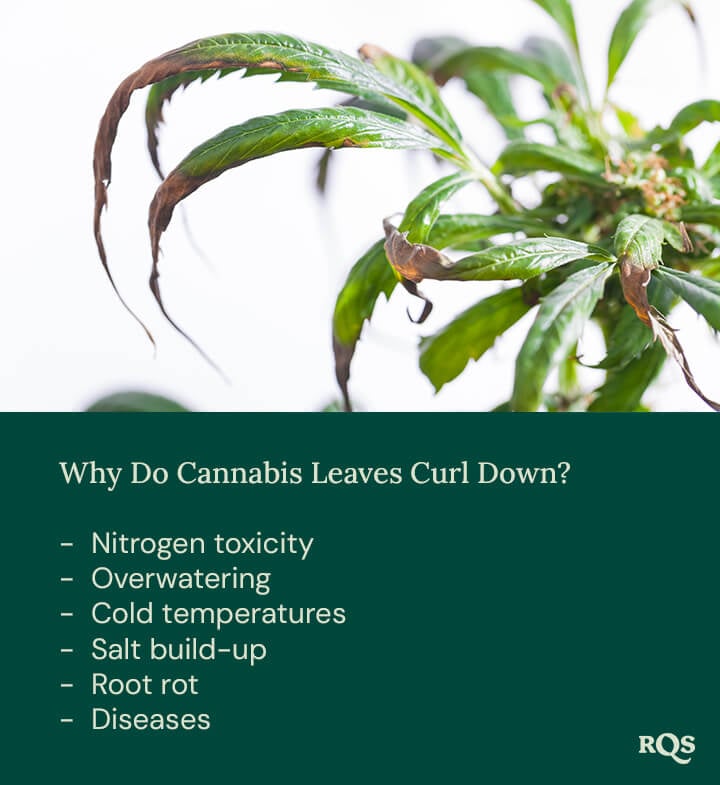
Common Causes of Cannabis Leaf Curling and Their Solutions
So far, we’ve given you a general overview of the factors that cause cannabis leaves to curl up and down. Below, we’re going to take a deeper dive into each of them, including their symptoms and how to fix them.
-
Overwatering
Many novice growers make the mistake of overwatering. Cannabis plants certainly need water to survive and thrive, but applying too much does more harm than good.
Symptoms of Overwatering
The symptoms of overwatering include:
| Drooping leaves | Leaves curling downwards | Yellowing | Wilting | Slow growth | Lesions | Pest problems | Root rot |
| Drooping leaves | Leaves curling downwards | Yellowing | Wilting | Slow growth | Lesions | Pest problems | Root rot |
How to Fix Overwatering
To fix overwatering, most growers find success by adhering to a simple rule; use your finger to probe the soil, and only water your plants once the top 3 cm has completely dried out.
-
Light Stress
Much like with water, cannabis plants depend on light to grow. However, light sources that are too powerful or positioned too close to the canopy can stress plants out.
Symptoms of Light Stress
The symptoms of light stress include:
|
Leaves curling upwards |
Bleaching |
Yellowing upper leaves and buds |
Stunted bud growth |
Wilting |
|
Leaves curling upwards |
Bleaching |
Yellowing upper leaves and buds |
Stunted bud growth |
Wilting |
Fixing Light Stress
To reduce light stress, keep your light source around 35 cm from the top of the canopy at all times. If your light has a dimmer feature, adjust the intensity until you find the sweet spot. Improving airflow and ventilation by installing fans can also help to take the edge off once the previous steps have been taken.
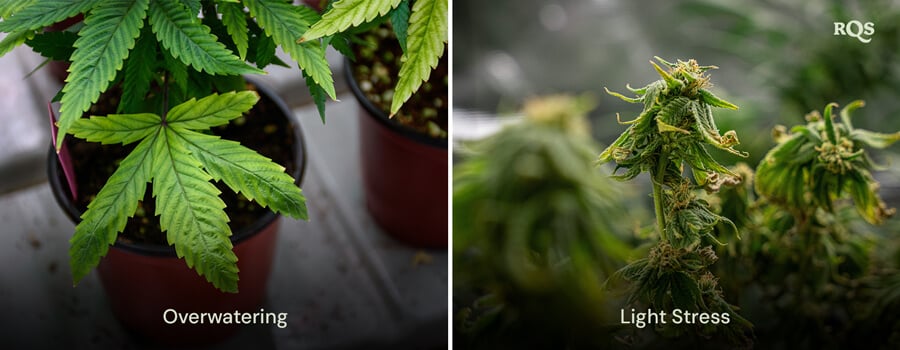
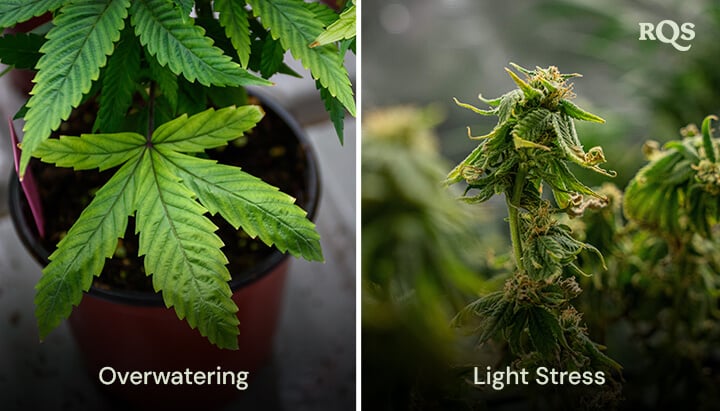
-
Temperature Extremes
Cannabis plants appreciate the heat and thrive at temperatures of around 21–26°C. Extreme highs and lows in temperature can slow plant growth, damage tissues, and even kill off plants entirely.
Heat Stress in Cannabis Plants
Cannabis plants can handle excessively high temperatures for short periods of time. However, temps of 30°C and above for long periods can cause the following symptoms of heat stress:
| Upward-curling leaves | Wilting | Yellowing or browning leaves | Burnt or crispy leaves | Stunted growth | Reduced flower production | Discoloured buds |
| Upward-curling leaves | Wilting | Yellowing or browning leaves | Burnt or crispy leaves | Stunted growth | Reduced flower production | Discoloured buds |
To avoid heat stress in your weed plants, use a thermo-hygrometer to measure the temperature and humidity of your growing space, and use fans and air conditioners as necessary. Outdoors, shade cloth can help to reduce sun exposure during heatwaves.
-
Cold Stress in Cannabis Plants
Cannabis plants have a good tolerance to cold spells, but extended exposure to temperatures of 15°C and below can cause the following symptoms of cold stress:
|
Downward-curling leaves |
Slow growth |
Yellowing and browning leaves |
Brittle leaves |
Poor bud development |
|
Downward-curling leaves |
Slow growth |
Yellowing and browning leaves |
Brittle leaves |
Poor bud development |
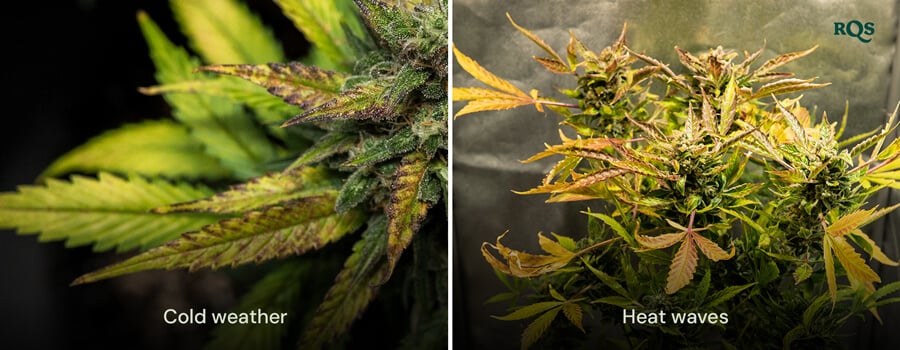
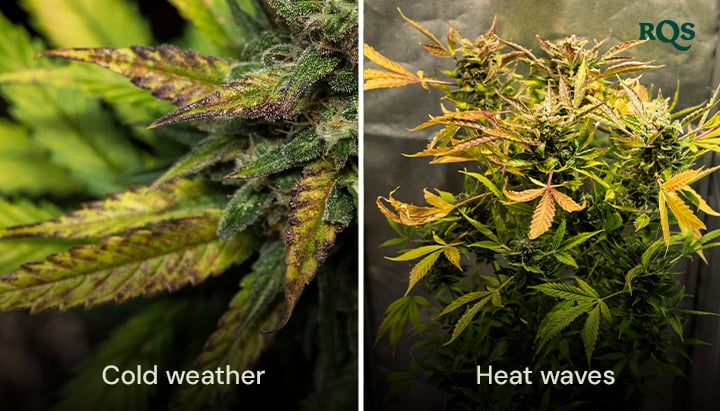
-
Humidity Issues
Humidity—the amount of moisture in the air—is another important variable when growing cannabis. The sweet spot for humidity varies during each stage of the growing cycle:
- Seedling stage: 65–70%
- Vegetative stage: 50–60%
- Flowering stage: 40–50%
Symptoms of Low Humidity
When humidity levels drop too low, you’ll encounter these issues:
|
Leaves curling inwards, forming a “canoe” shape |
Dry, crisp leaves | Stunted growth | Dry buds | Browning leaves |
|
Leaves curling inwards, forming a “canoe” shape |
Dry, crisp leaves | Stunted growth | Dry buds | Browning leaves |
Symptoms of High Humidity
High humidity also has a negative impact on weed plants during different stages of growth. The signs include:
| Downward-curling leaves |
Collapsing seedlings (damping off) |
Bud rot and mildew | Slow bud development |
| Downward-curling leaves |
Collapsing seedlings (damping off) |
Bud rot and mildew | Slow bud development |
Fixing Humidity Problems
To fix humidity problems, you’ll first need to place a hygrometer in your growing space to get an accurate read of moisture levels. To tackle low humidity, use humidifiers and irrigation. Use fans and dehumidifiers to correct high humidity.
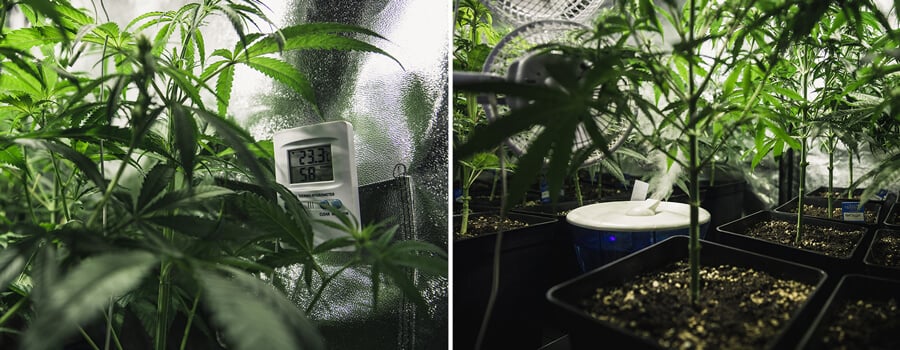
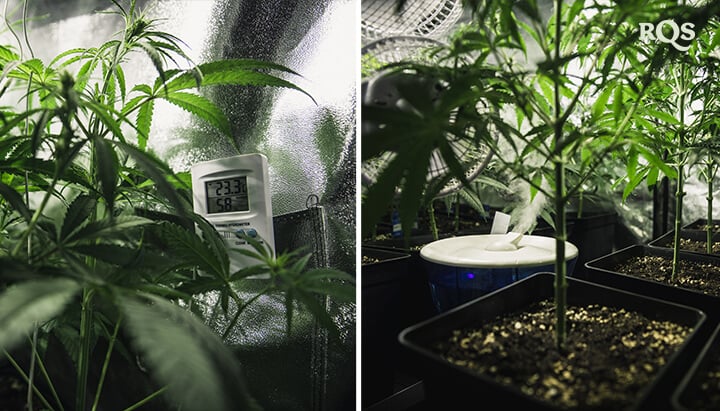
-
Pests and Diseases
Both indoor and outdoor cannabis plants are vulnerable to a host of pests and diseases. These organisms cause all kinds of symptoms, including leaf curling.
- Common Pests That Cause Curling
Some of the most common cannabis pests that cause leaf curling are:
- Spider mites: These sap-sucking insects leave cobweb-like threads all over buds and cause leaves to curl downwards.
- Aphids: Also sap-suckers, aphids’ feeding mechanism deprives plants of essential nutrients, causing leaves to curl downwards or inwards.
- Thrips: In scraping off the outward layer of foliage when feeding, thrips cause cannabis leaves to curl upwards.
- Whiteflies: These tiny moth-like insects cause leaves to turn downwards and yellow.
- Fungus gnats: By damaging plant roots, fungus gnats disrupt water and nutrient uptake and cause leaves to curl downwards.
- How to Treat Pests
Rather than spraying plants with toxic pesticides, there are a range of organic and natural ways to treat pests on weed plants. Check out some of the most effective methods:
- Neem oil: Containing azadirachtin, neem oil repels insects and inhibits their ability to feed on plants.
- Insecticidal soaps: These products kill insects by damaging their cell membranes.
- Predatory insects: Beneficial insects are an effective way of dealing with pest issues; ladybug larvae are capable of eating hundreds of aphids each day.
- Diseases That Cause Curling Leaves
As well as pests, cannabis plants are susceptible to bacterial, fungal, and viral diseases that cause leaf curling. Some of the most common culprits include:
- Bacterial blight: Leaves develop necrosis and curl downward.
- Verticillium wilt: This disease affects stem vasculature and causes leaves to turn downward.
- Botrytis: Also known as bud rot, this disease causes leaves to curl downward.
- Tobacco mosaic virus: TMV manifests as patchy discolouration and causes leaves to curl either upwards or downwards.
- Genetics
Environmental factors are the primary driver of leaf curling. There are no well-documented correlations between genetics and leaf curling in cannabis. However, genetic mutations can give rise to unusual leaf shapes and colours. These include tri-leaf seedlings, variegation, and leaves with complex and chaotic leaflet patterns.
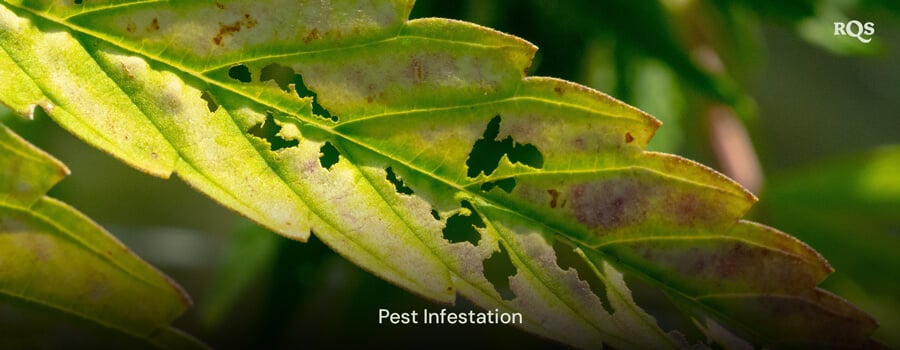
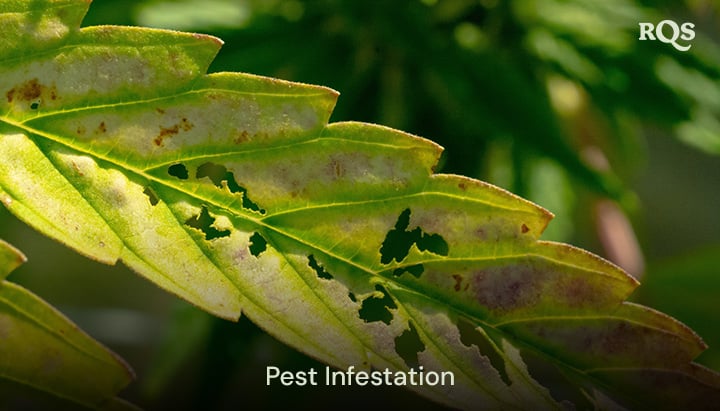
Preventing Cannabis Leaf Curling: Best Practices
Leaf curling isn't just an eyesore, but it indicates stressors that have the potential to impact plant health and productivity. To prevent leaf curling, you need to stay on top of key environmental variables.
-
Environmental Monitoring
Thermo-hygrometers are an indispensable tool in preventing leaf curling, providing real-time data on temperature and humidity.
Considering these figures, you can use fans, humidifiers/dehumidifiers, and air conditioners to keep your plants in their sweet spot. Check your thermo-hygrometer at least once per day and make the necessary changes.
To save work, you can automate your grow using a sensor and controller to adjust lighting, temperature, and humidity accordingly.
-
Routine Inspections
Pay close attention to your plants throughout the entire growing cycle. As well as checking for leaf curling, frequently measure light distance, soil pH, and look for signs of pests and diseases.
-
Balanced Nutrient Regimen
Develop a nutrient regimen to meet the needs of your plants throughout each stage of the growing cycle. Make an effort to stick to it to avoid nutrient deficiency or toxicity.
-
Cleaning and Maintenance
Keep your growing space clean and tidy to prevent pests and diseases that cause leaf curling. Be mindful of bringing infected plant material into the area, and use preventative measures such as sticky traps to prevent insect infestations before they get a foothold.
Avoid Curling Cannabis Leaves for Better Results
The aim of preventing and treating cannabis leaves goes far beyond the leaves themselves. Whether leaves curl up or down, they’re telling you something about the health status of your weed plants.
Now, not only are you aware of what they’re trying to say, but you’re equipped with the necessary steps to remedy each cause. Try your best to prevent leaf curling from happening, and quickly deploy the treatments listed above to bring your plants back to full health.


























